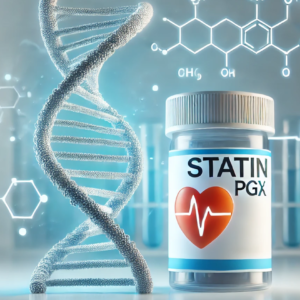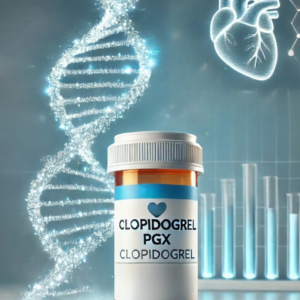Warfarin PGx Test
The Warfarin PGx Test is a specialized Warfarin pharmacogenomic test designed to tailor warfarin therapy to an individual’s unique genetic profile. Warfarin, a widely prescribed anticoagulant, plays a critical role in preventing strokes and blood clots. However, its effectiveness hinges on precise dosing, as even small variations can lead to serious consequences like bleeding complications or insufficient clot prevention.
By leveraging pharmacogenomic testing to guide warfarin dosing, this test evaluates genetic factors that influence how the body metabolizes and responds to warfarin. It offers healthcare providers precise recommendations for dosing, ensuring safer and more effective treatment. Integrating pharmacogenomic testing for warfarin response into anticoagulant therapy marks a significant step forward in personalized medicine, minimizing risks and optimizing patient outcomes.
1. Who Should Take the Warfarin PGx Test?
- Individuals starting warfarin therapy for conditions like atrial fibrillation, deep vein thrombosis (DVT), or post-surgical clot prevention.
- Those with a history of complications (e.g., bleeding or clotting) while on warfarin.
- People with a family history of clotting disorders or cardiovascular diseases.
2. Why Is This Test Important?
Warfarin is highly effective but poses significant risks for individuals with certain genetic variations. A Warfarin pharmacogenomic test provides insights into genetic factors affecting warfarin metabolism, enabling healthcare providers to personalize treatments, reduce adverse reactions, and improve the safety of long-term anticoagulation therapy.
Key Reasons for Genetic Testing
- Accurate Dosing:
- Personalized prescriptions ensure reduced risks and better patient safety. (1)
- Warfarin has a narrow therapeutic window; improper dosing can lead to life-threatening complications like internal bleeding or stroke. (3)
- Some individuals metabolize warfarin too quickly, reducing its effectiveness and increasing clot risks.
- Fewer Side Effects:
- Minimizes complications such as bleeding or clotting.
- Patients genetically predisposed to slow warfarin metabolism face higher bleeding risks. (2)
- Improved Outcomes:
- Enhanced safety and efficacy in anticoagulation therapy through pharmacogenomic testing for warfarin response.
Impact of Warfarin and Genetic Insights
- Genetic Variations:
- Genetic variations in CYP2C9 and VKORC1 significantly impact how patients metabolize warfarin, affecting dose requirements and treatment success.
- Need for Better Management:
- Patients in rural areas, such as India, often experience poor clot control with suboptimal International Normalized Ratio (INR) levels. (4)
- Studies show that warfarin genotyping reduces hospitalization risk and improves patient outcomes, supporting its integration into routine clinical practice (5)
3. DrOmics pharmacogenomics test for warfarin.
At DrOmics Labs, we offer the Warfarin PGx Test to ensure personalized and effective anticoagulant therapy. This test identifies genetic factors influencing how your body responds to warfarin, enabling tailored treatment to optimize blood thinning and minimize complications. By analyzing your unique genetic profile, the test provides specific recommendations for the most effective warfarin dosage, reducing the risk of blood clots and bleeding events. Powered by advanced technology, it delivers precise and reliable insights to guide your treatment decisions. With DrOmics Labs, you benefit from a customized treatment plan that ensures safer therapy, better outcomes, and enhanced cardiovascular health.
| Drug | Disease |
| warfarin | Cardiovascular Disease |
| Hemorrhage | |
| Thrombosis | |
| Atrial Fibrillation | |
| time to therapeutic inr | |
| time in therapeutic range | |
| Atrial Fibrillation | |
| heart valve replacement | |
| over-anticoagulation | |
| heart valve replacement | |
| Venous thromboembolism |
4 . How does this work
- Sample Collection: A simple DNA sample, typically from a cheek swab, is collected.
- Comprehensive Analysis: Genetic markers are analyzed to identify inherited risk factors and pharmacogenomic profiles.
- Actionable Results: Receive a detailed report highlighting genetic predispositions, risk factors, and personalized treatment recommendations.
- Consultation: Results can be reviewed with a genetic counselor or cardiovascular specialist to tailor a treatment plan.






Reviews
There are no reviews yet.